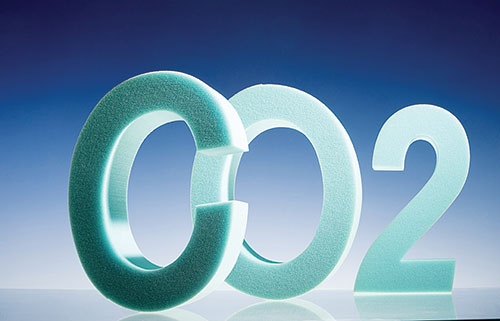Bayer harnesses green house gas for production

>>Bayer provides innovative solutions
The company has started the planning process for the construction of a production facility at its site in Dormagen, Germany, where CO2 will be used to produce a precursor for high-quality foam. The objective is to initially make larger quantities of this precursor available to selected processors from 2015.
According to Bayer, the use of carbon dioxide benefits the environment. CO2 replaces the use of fossil raw materials such as petroleum, and the German company expects the new process to provide economic advantages over conventional production methods.
“After successfully completing the test phase, we are now launching stage 2 with the target of commercialising the product,” said Patrick Thomas, chief executive officer of Bayer MaterialScience, adding that the first use of the new CO2-based flexible foam will be for the production of mattresses.
“CO2 is taking on a new light. The waste gas is turning into a useful and profitable raw material. That makes us one of the first companies worldwide to take an entirely different approach to the production of high-quality foams,” said Thomas.
The planned production facility in Dormagen will have a capacity of several thousand metric tonnes. “This will not be enough to accommodate market demand, of course. It is Bayer’s patent-registered technology and we have not yet decided to be the exclusive producer of this innovative polyol. Licencing might also be a possibility,” he added.
With 2012 sales of 11.5 billion euros, Bayer MaterialScience is among the world’s largest polymer companies. Business activities are focused on the manufacture of high-tech polymer materials and the development of innovative solutions for products used in car manufacturing, electrical goods and electronics, construction and sports and leisure industries.
Bayer collaborated with partners from industry and academia to develop the process, which has been tested intensively over the last two years. As part of the publicly funded Dream Production research project – a pilot plant at Bayer’s main site in Leverkusen produced smaller quantities of the precursor polyol, in which CO2 was chemically bound.
The substance is used for the production of polyurethane foam. This high-quality material can be found in many everyday items, including upholstered furniture, automotive parts, refrigeration equipment and insulation material for buildings. In internal tests, the new foams show at least the same high quality as conventional material based entirely on fossil fuels.
What the stars mean:
★ Poor ★ ★ Promising ★★★ Good ★★★★ Very good ★★★★★ Exceptional
Latest News
More News
- State corporations poised to drive 2026 growth (February 03, 2026 | 13:58)
- Why high-tech talent will define Vietnam’s growth (February 02, 2026 | 10:47)
- FMCG resilience amid varying storms (February 02, 2026 | 10:00)
- Customs reforms strengthen business confidence, support trade growth (February 01, 2026 | 08:20)
- Vietnam and US to launch sixth trade negotiation round (January 30, 2026 | 15:19)
- Digital publishing emerges as key growth driver in Vietnam (January 30, 2026 | 10:59)
- EVN signs key contract for Tri An hydropower expansion (January 30, 2026 | 10:57)
- Vietnam to lead trade growth in ASEAN (January 29, 2026 | 15:08)
- Carlsberg Vietnam delivers Lunar New Year support in central region (January 28, 2026 | 17:19)
- TikTok penalised $35,000 in Vietnam for consumer protection violations (January 28, 2026 | 17:15)
















 Mobile Version
Mobile Version